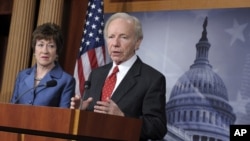A U.S. Senate panel has harshly criticized the State Department's handling of security at the diplomatic mission in Benghazi, Libya, calling the security situation at the facility "woefully inadequate" before the deadly September 11 terrorist attack on the compound.
The chairman of the Senate Homeland Security Committee, Senator Joseph Lieberman, said his panel's investigation found a "rising crescendo" of evidence that Benghazi had become unstable and the likelihood of an attack was increasing.
"The tragedy is, however, that the reaction to the flashing red indicators was woefully inadequate to the dangers that the flashing light was indicating and as a result this tragedy occurred," he said. "On the one hand, you have dozens of intelligence reports and acts of violence in Benghazi which make very clear that this is becoming one of the most dangerous places American diplomats and government personnel can be probably outside a war zone like Afghanistan."
The attack on the diplomatic mission and nearby annex killed four people, including U.S. Ambassador Chris Stevens.
Lieberman said Libya did not have the capacity to live up to its responsibility as a host nation to provide adequate security for the diplomatic mission.
"You got a dangerous situation and inadequate security and yet the State Department failed to take adequate steps to fill those security gaps, failed to adequately support security requests from its own personnel in Benghazi, and failed to make the one remaining decision that cries out to me as I look at the evidence here, which was to simply say 'We've got to close this facility because we can't protect American personnel in Benghazi," he said.
He said the Obama administration, in the midst of a heated election campaign, made inconsistent statements about Benghazi, despite it clearly being a terrorist attack.
Senator Susan Collins, the committee's ranking Republican member, said there were clear warning indicators.
"There had been numerous previous attacks, including two at our own very compound in Benghazi as well as other attacks aimed at Western targets," she said.
Collins said the terrorists "essentially walked into the compound virtually unimpeded and set it ablaze."
The U.S. ambassador to the United Nations, Susan Rice, withdrew her name from consideration for secretary of state over comments she made following the attack on Benghazi, describing it as a "spontaneous" event following anti-American protests.
The chairman of the Senate Homeland Security Committee, Senator Joseph Lieberman, said his panel's investigation found a "rising crescendo" of evidence that Benghazi had become unstable and the likelihood of an attack was increasing.
"The tragedy is, however, that the reaction to the flashing red indicators was woefully inadequate to the dangers that the flashing light was indicating and as a result this tragedy occurred," he said. "On the one hand, you have dozens of intelligence reports and acts of violence in Benghazi which make very clear that this is becoming one of the most dangerous places American diplomats and government personnel can be probably outside a war zone like Afghanistan."
The attack on the diplomatic mission and nearby annex killed four people, including U.S. Ambassador Chris Stevens.
Lieberman said Libya did not have the capacity to live up to its responsibility as a host nation to provide adequate security for the diplomatic mission.
"You got a dangerous situation and inadequate security and yet the State Department failed to take adequate steps to fill those security gaps, failed to adequately support security requests from its own personnel in Benghazi, and failed to make the one remaining decision that cries out to me as I look at the evidence here, which was to simply say 'We've got to close this facility because we can't protect American personnel in Benghazi," he said.
He said the Obama administration, in the midst of a heated election campaign, made inconsistent statements about Benghazi, despite it clearly being a terrorist attack.
Senator Susan Collins, the committee's ranking Republican member, said there were clear warning indicators.
"There had been numerous previous attacks, including two at our own very compound in Benghazi as well as other attacks aimed at Western targets," she said.
Collins said the terrorists "essentially walked into the compound virtually unimpeded and set it ablaze."
The U.S. ambassador to the United Nations, Susan Rice, withdrew her name from consideration for secretary of state over comments she made following the attack on Benghazi, describing it as a "spontaneous" event following anti-American protests.
Some information for this report was provided by Reuters.





